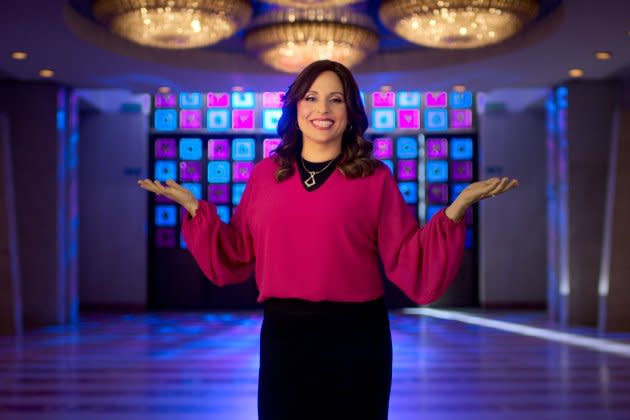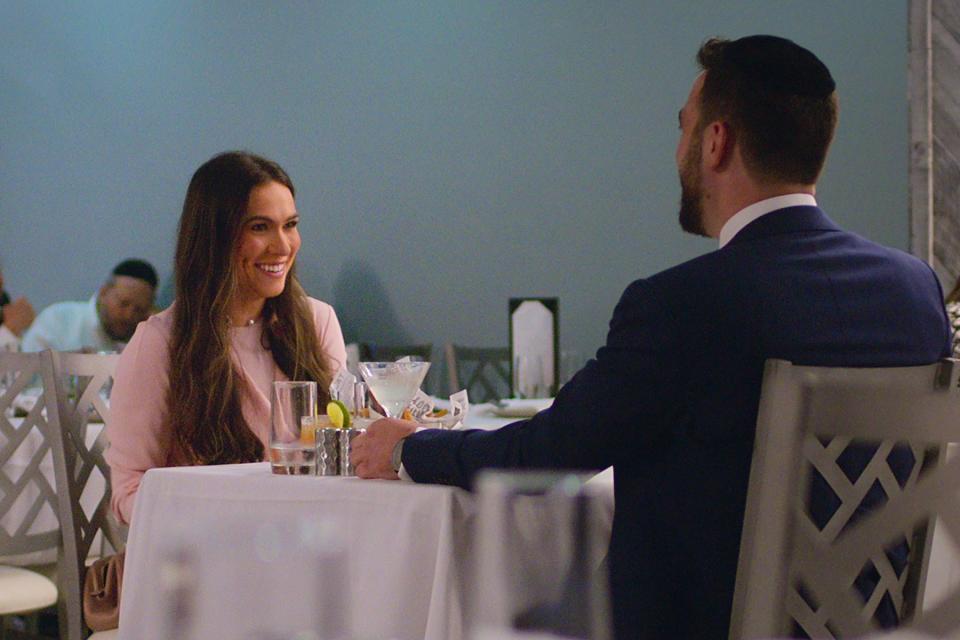‘Jewish Matchmaking’ Could’ve Been a Shanda. But It’s Smart and Sweet
- Oops!Something went wrong.Please try again later.

There’s a saying in the Jewish community that certain things are bad for the Jews. The list largely includes people with a great deal of power and money who use it for nefarious ends: Bernie Madoff, Jeffrey Epstein, Woody Allen. (Other things that are arguably not-so-great for the Jews: Einstein’s Bagels; virtually any male character from a Noah Baumbach film; and the fact that the only Jewish character in The Babysitters’ Club series is a whiny curly-haired girl with allergies.)
I had assumed that Jewish Matchmaking, Netflix’s new dating show, would be one more entry on the list. I had assumed that, like its predecessor Indian Matchmaking, it would only be representative of a sliver of the Jewish community, or replete with stereotypical depictions of either shallow, materialistic twenty- and thirty-somethings obsessed with conventional markers of success. And indeed, both of those criticisms could reasonably be made about Jewish Matchmaking, which is at its core a fairly formulaic Netflix dating show. But one thing that could also be said about Jewish Matchmaking is that it has heart; put another way, it gave this Jewish viewer a surprising amount of naches.
More from Rolling Stone
That’s in large part due to the casting of the matchmaker central to the show, Aleeza Ben Shalom, a dating coach who claims to have 200 weddings under her belt. Ben Shalom is an Orthodox Jew, but she works with Jews from a wide range of backgrounds and levels of observancy, and the show takes pains to explain the various customs and factions within the community (for example, Sephardic versus Ashkenazi Jews), in a way that is goy-friendly without being overly didactic. Ben Shalom is warm without being cloying (though she does, like many other reality TV show characters, have an irritating penchant for rhyming catchphrases, such as “date ‘em till you hate ‘em” or “keep mystery in your history”), wry without being bitchy, and insightful without being patronizing. She is also remarkably good at her job, keeping her clients’ often lofty criteria for physical appearance in mind while encouraging them to dig deeper beneath the surface to make connections. Three episodes in, my husband, who had unbeknownst to me been watching over my shoulder, looked over from his laptop and proclaimed, with zero trace of irony, “She has a gift.”
Like many other dating shows, the cast members have a tendency to be shallow and picky to an extreme; Dani, a 27-year-old woman with an Instagram account for her own eyebrows, expresses her consternation with a suitor who wears shoes and socks on a jet ski date; while Ori, a 30-year-old Israeli-American man, is particularly obsessed with finding a Hebrew-speaking woman with blonde hair and blue eyes, to the degree that he totally dismisses an absolutely stunning match simply because she is brunette. Ben Shalom is patient with her ultra-picky charges while also being upfront with them: “Be into her more than you’re into you,” she advises Ori while coaching him to be less looks-obsessed, echoing the frustrations of the audience at home, who can’t help but wonder why a 30-year-old Adam Sandler lookalike who still lives at home with his parents has the audacity to be so choosy.
While Indian Matchmaking was lambasted by critics for featuring only an elite sliver of Indian culture, Jewish Matchmaking features a (relatively) diverse range of singles, from Sephardic Jews to Mizrahi Jews to Jews of color (there’s even a Jewish woman who loves riding motorcycles, which, to this Jew terrified of any vehicles with less than four wheels, constitutes diversity in my book). In truth, however, most people watching the show are not seeking out nuanced and wide-ranging representations of the Jewish community; they want to watch bone-crushingly awkward dates and dramatic clashes of personality, with the occasional sweet romantic moment sprinkled in. Jewish Matchmaking delivers both, but it also gives us something surprising for a Netflix dating show: real insight into the ties that bind the Jewish community.

No time in history is really an ideal time to be Jewish, but with the rise of anti-Semitic incidents in the United States over the past few years, as well as major celebrities openly spreading anti-Jewish conspiracy theories and praising Hitler, the past few years have felt particularly difficult. Jewish Matchmaking doesn’t go into detail about the current political climate, but at one point, a castmate explains why it’s so important for her to marry someone of the Jewish faith, saying her great-grandmother escaped Libya with gold in her bra to keep her Judaism, while her grandfather survived the Holocaust. “I want to be a part of a miracle that continues that,” she says.
While I am neither an observant Jew nor one particularly invested in the idea of instilling Jewish values in my family, as the cast members of the show are, to me that is precisely what being Jewish is all about: continuing the miracle of our existence and persisting against all odds, regardless of how you practice or how you self-identify or whether you’re weirdly obsessed with your own eyebrows. Jewish Matchmaking, for all of its silliness, makes it clear to a general audience that, to paraphrase Ben Shalom, there are just as many ways of being Jewish as there are Jews in the world, despite centuries-old efforts to ensure otherwise. And that is what it keeps it from being a shanda.
Best of Rolling Stone

